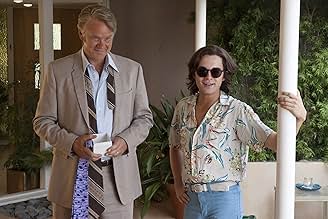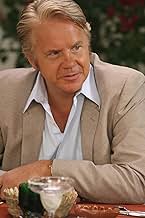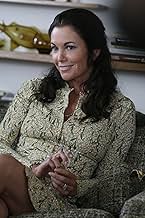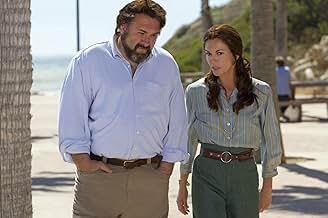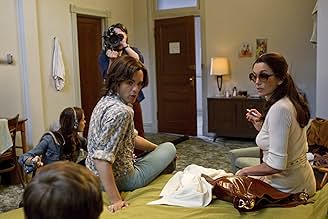IMDb रेटिंग
6.5/10
4.1 हज़ार
आपकी रेटिंग
अपनी भाषा में प्लॉट जोड़ेंA behind-the-scenes look at the making of the first American family to be the subjects of a reality TV show.A behind-the-scenes look at the making of the first American family to be the subjects of a reality TV show.A behind-the-scenes look at the making of the first American family to be the subjects of a reality TV show.
- निर्देशक
- लेखक
- स्टार
- 1 प्राइमटाइम एमी जीते
- 7 जीत और कुल 34 नामांकन
फ़ीचर्ड समीक्षाएं
In 1971 an all American family from Santa Barbara in California were chosen, seemingly at random, to take part in a TV experiment. It was to become the world's first reality TV show called "An American Family" and its stars, the Loud family – both by name and at times by nature, were to become national phenomena.
But to get to legendary status the show's producer, Craig Gilbert, had a pretty hard sell to the board of TV company PBS who were reluctant, to say the least, to commit to the show and began to baulk at the cost of production as the film stock costs (in particular) began to mount.
Their concern was about the "view-ability" of the show and whether it would find an audience. They needn't have worried because what gradually emerged was a tale of a swinging misogynist father (Tim Robbins), a hopeless and helpless (but sultry in Gilbert's opinion) Mom played brilliantly by Diane Lane and a screamingly gay son, Lance, played gleefully by Thomas Dekker. Not to mention a looky-likey Rolling Stones band fronted by the other two boys.
But it's what's going on in the mind of Producer Gilbert (played masterfully by James Gandolfini with a very unlikely full beard and absolutely no gangster element whatsoever to draw on) that is the meat of the movie. Well, I say a movie but it's actually a documentary set within a drama, about a reality TV documentary that turns out larger than life than any drama.
At points we see side by side comparisons between the "real" family and the 2011 actors. It's uncanny. Gandolfini manipulates all sides as he makes the "action" more and more interesting but in doing so contributes to the family meltdown and the confidence of his crew. It's terrific.
I don't think this ever made it to cinema, it's an HBO production, but it's great and I saw it last night on Sky Atlantic so is likely to be repeated at some time. If it is tune in because it's a little gem.
But to get to legendary status the show's producer, Craig Gilbert, had a pretty hard sell to the board of TV company PBS who were reluctant, to say the least, to commit to the show and began to baulk at the cost of production as the film stock costs (in particular) began to mount.
Their concern was about the "view-ability" of the show and whether it would find an audience. They needn't have worried because what gradually emerged was a tale of a swinging misogynist father (Tim Robbins), a hopeless and helpless (but sultry in Gilbert's opinion) Mom played brilliantly by Diane Lane and a screamingly gay son, Lance, played gleefully by Thomas Dekker. Not to mention a looky-likey Rolling Stones band fronted by the other two boys.
But it's what's going on in the mind of Producer Gilbert (played masterfully by James Gandolfini with a very unlikely full beard and absolutely no gangster element whatsoever to draw on) that is the meat of the movie. Well, I say a movie but it's actually a documentary set within a drama, about a reality TV documentary that turns out larger than life than any drama.
At points we see side by side comparisons between the "real" family and the 2011 actors. It's uncanny. Gandolfini manipulates all sides as he makes the "action" more and more interesting but in doing so contributes to the family meltdown and the confidence of his crew. It's terrific.
I don't think this ever made it to cinema, it's an HBO production, but it's great and I saw it last night on Sky Atlantic so is likely to be repeated at some time. If it is tune in because it's a little gem.
Naturally, it doesn't feel real. The first show of its kind, brought America into a debacle of sorts. Was this an "art form" or a voyeuristic trip into the unknown? Now, the whole thing feels manipulated, fragmented and utterly unreal. The gay son, brought the situation into the main stream but it was misunderstood, or was it? The one thing I got out of this films was a superlative performance by Diane Lane. She is truly extraordinary. But the task of reproducing the "moment" feels a bit all over the place. Going from highlight to highlight, if you didn't know about it you still won't really understand. This is no Truman Show. The dramatic structure seems not merely uncertain but downright opportunistic. Needless to say, I was disappointed.
"Cinema Verite" may be a new art form: a drama shot in semi-documentary style about a documentary series (shot in 1971, televised nationally in 1973) which itself hovered between the spontaneous and the rehearsed. This 90-minute effort takes about a third of its running time time to get off the ground, but when it does it becomes fascinating as both sociology and drama.
At first it seems as if there is no point in re-enacting the back story to the famous series that followed the ups and downs of the upper-middle-class Loud family of Santa Barbara. Nothing particularly interesting happens as a producer (James Gandolfini) talks a married couple (Diane Lane and Tim Robbins) into allowing cameras into their lives for an unprecedentedly close look at the perfect American family. The real drama begins only when the participants are forced to grapple with the big choices (what and what not to film, what and what not to do when the camera is rolling, how to handle the fact that their lives have decisively changed once the cameras entered). The actors here give themselves totally to this multi-leveled process and come out with flying colors.
We see the actual Loud family in snippets from the original series juxtaposed with their contemporary impersonators who seamlessly fill their shoes, sometimes in mid- conversation. The casting is very good; the resemblances are striking. (But as close a match as Diane Lane is to Pat Loud, Demi Moore would have been even closer.) Some clever member of the creative team even decided to frame the whole enterprise with Mama Cass's 1969 song hit "Dream a Little Dream of Me" (originally a hit in 1931, about 40 years before "An American Family"'s time), allowing the song to surface again, 40 more years down the road, as underscoring to an examination of "the first reality show." A neat touch.
One thing they got wrong was the performance of the underground play "Vain Victory" which the mother attends in the company of her gay son, Lance. The performers and venue for such ragtag productions were a lot funkier than depicted in this otherwise spot-on production. Of course, by 2011 cultural standards such drag acts are as tame and commonplace as Twinkies, but they were enough to drive Pat Loud out of the room back in '71.
At first it seems as if there is no point in re-enacting the back story to the famous series that followed the ups and downs of the upper-middle-class Loud family of Santa Barbara. Nothing particularly interesting happens as a producer (James Gandolfini) talks a married couple (Diane Lane and Tim Robbins) into allowing cameras into their lives for an unprecedentedly close look at the perfect American family. The real drama begins only when the participants are forced to grapple with the big choices (what and what not to film, what and what not to do when the camera is rolling, how to handle the fact that their lives have decisively changed once the cameras entered). The actors here give themselves totally to this multi-leveled process and come out with flying colors.
We see the actual Loud family in snippets from the original series juxtaposed with their contemporary impersonators who seamlessly fill their shoes, sometimes in mid- conversation. The casting is very good; the resemblances are striking. (But as close a match as Diane Lane is to Pat Loud, Demi Moore would have been even closer.) Some clever member of the creative team even decided to frame the whole enterprise with Mama Cass's 1969 song hit "Dream a Little Dream of Me" (originally a hit in 1931, about 40 years before "An American Family"'s time), allowing the song to surface again, 40 more years down the road, as underscoring to an examination of "the first reality show." A neat touch.
One thing they got wrong was the performance of the underground play "Vain Victory" which the mother attends in the company of her gay son, Lance. The performers and venue for such ragtag productions were a lot funkier than depicted in this otherwise spot-on production. Of course, by 2011 cultural standards such drag acts are as tame and commonplace as Twinkies, but they were enough to drive Pat Loud out of the room back in '71.
This film speaks volumes about the ethical dilemmas doc-makers (and "reality TV" producers) all-too-frequently face. Some choose to do the ethical thing and tell an unvarnished truth, most are happy to sell their soul for ratings. Strong filmmaking from the folks who brought us American Splendor and have now once again cut to the heart of the American Dream. If you watch "reality TV" and believe it, this is mandatory viewing. Diane Lane will break your heart, Tim Robbins shatters deeply held delusions about the Playboy/Esquire lifestyle and James Gandofini's strong performance is a scream in the dark urging us to dump the junk TV and watch more substantial fare. This is great American filmmaking.
I wasn't born when the Louds became a major deal in the American public consciousness, as the first sort of "reality" family, but that doesn't matter as I should still be able to take this story on its own terms (for example, what if hypothetically it was all made up, how would it work as a story unto itself). Of course the filmmakers are adept at taking real life and spinning it into docudrama - their breakout sensation was an adaptation of the real life guy who made the comic book American Splendor, Harvey Pekar, which included interviews with the real life subjects - so one would expect this to have some authenticity as it's all about the realm of what is real-real and camera-real. One wonders what the Maysles thought of this filmmaker Gilbert.
As it stands this man, played here by the late James Gandolfini (in the kind of performance that makes me miss him all the more, it's largely subtle work until the third act), is not exactly Maysles. I don't know how close they got to their subjects like the Beales (this made me think back to Grey Gardens quite a bit, also a "reality" movie in its way), but with the Louds it was the "All-American Family", and the ideal for Gilbert in the early 70's was to document it in an anthropological sense: what if aliens come down, after all, in a thousand years and want to see what we were like? It's easy to piece that together in drama, but then once you get the philosophies of Marshall MacLuhan into the mix, which this seems to also be alluding to throughout in a subtextual way, being 'natural' is difficult... at first.
This story of filmmakers following this family - which includes Tim Robbins and Diane Lane as the seemingly happy married couple of a bunch of interesting, happy kids (including one who is gay but quite happy to be in the scenes of Andy Warhol and the Chelsea Hotel and the like) - is certainly gripping for most of its run-time, and gains traction as the drama unfolds for the family. There's infidelity, there's marital strife, and there's Gilbert (usually in the background) with his cameraman and sound recordist in the house getting it all. Sometimes the family doesn't notice they're there. Then they do, and the looks to the camera give it away (maybe my favorite moment is when Robbins, as he's playing the patriarch in an exceedingly tragic and sad moment, gets a foolish grin on his face as he notices the camera as he's getting in his car - it's perfect, it's just how we all would be in that situation, to hide away the pain).
All of the actors can't be faulted in the slightest, and along with Gandolfini and Robbins it's hard to note point out Lane giving one of her best performances in recent memory. But there are times when things seem a little rushed... actually, a lot rushed in the final ten minutes or so, when the series finally airs on PBS and the family has to deal with the fallout. I wish we could see more of this, but the whole movie is only 90 minutes, and after giving us sort of a condensed 'greatest hits' of what this family and the filmmakers went through over several months (almost 80 days to be exact, however over much time I don't know), there seems like it's missing things. I wish there was more there there, and that may be a thing of 'no good movie is long enough' but it's more than that - by the time Cinema Verite wraps up what it has to say, and it's here that the Springer and Pulcini combine the dramatized with the actual of the family on Dick Cavette, it feels a little too little too late.
What if it had been more like 'Splendor', with combining the dramatized with the actual footage? Maybe HBO only gave them so much time, but it feels off in that way. But what is here is still mostly substantial for drama and pathos, and they even get us to feel for a character as lousy (at least from what we can see) as Mr. Loude, in part due to Robbins but also just solid writing. On the whole a little simplistically drawn, and at the same time in the small moments it carries a lot of worth. And to think how far we've come... or fallen, I should say, with what people will let themselves be seen as in "reality" television.
As it stands this man, played here by the late James Gandolfini (in the kind of performance that makes me miss him all the more, it's largely subtle work until the third act), is not exactly Maysles. I don't know how close they got to their subjects like the Beales (this made me think back to Grey Gardens quite a bit, also a "reality" movie in its way), but with the Louds it was the "All-American Family", and the ideal for Gilbert in the early 70's was to document it in an anthropological sense: what if aliens come down, after all, in a thousand years and want to see what we were like? It's easy to piece that together in drama, but then once you get the philosophies of Marshall MacLuhan into the mix, which this seems to also be alluding to throughout in a subtextual way, being 'natural' is difficult... at first.
This story of filmmakers following this family - which includes Tim Robbins and Diane Lane as the seemingly happy married couple of a bunch of interesting, happy kids (including one who is gay but quite happy to be in the scenes of Andy Warhol and the Chelsea Hotel and the like) - is certainly gripping for most of its run-time, and gains traction as the drama unfolds for the family. There's infidelity, there's marital strife, and there's Gilbert (usually in the background) with his cameraman and sound recordist in the house getting it all. Sometimes the family doesn't notice they're there. Then they do, and the looks to the camera give it away (maybe my favorite moment is when Robbins, as he's playing the patriarch in an exceedingly tragic and sad moment, gets a foolish grin on his face as he notices the camera as he's getting in his car - it's perfect, it's just how we all would be in that situation, to hide away the pain).
All of the actors can't be faulted in the slightest, and along with Gandolfini and Robbins it's hard to note point out Lane giving one of her best performances in recent memory. But there are times when things seem a little rushed... actually, a lot rushed in the final ten minutes or so, when the series finally airs on PBS and the family has to deal with the fallout. I wish we could see more of this, but the whole movie is only 90 minutes, and after giving us sort of a condensed 'greatest hits' of what this family and the filmmakers went through over several months (almost 80 days to be exact, however over much time I don't know), there seems like it's missing things. I wish there was more there there, and that may be a thing of 'no good movie is long enough' but it's more than that - by the time Cinema Verite wraps up what it has to say, and it's here that the Springer and Pulcini combine the dramatized with the actual of the family on Dick Cavette, it feels a little too little too late.
What if it had been more like 'Splendor', with combining the dramatized with the actual footage? Maybe HBO only gave them so much time, but it feels off in that way. But what is here is still mostly substantial for drama and pathos, and they even get us to feel for a character as lousy (at least from what we can see) as Mr. Loude, in part due to Robbins but also just solid writing. On the whole a little simplistically drawn, and at the same time in the small moments it carries a lot of worth. And to think how far we've come... or fallen, I should say, with what people will let themselves be seen as in "reality" television.
क्या आपको पता है
- ट्रिवियाIn the scene where Lance Loud is on the phone with his family, he reads a media description of himself and his "flamboyant, leech-like homosexuality". That's a direct quote from an article written for The New York Times by Anne Roiphe. She made equally scathing remarks about the entire Loud family.
- गूफ़The Louds' Mercedes has a California plate with the number style 1AAA000. These plates did not appear until 1980.
- कनेक्शनFeatured in The Tonight Show with Jay Leno: एपिसोड #19.129 (2011)
- साउंडट्रैकDream A Little Dream
Written by Fabian Andre, Gus Kahn & Wilbur Schwandt
Performed by Cass Elliot (as Mama Cass)
Courtesy of Geffen Records under license from Universal Music Enterprises
टॉप पसंद
रेटिंग देने के लिए साइन-इन करें और वैयक्तिकृत सुझावों के लिए वॉचलिस्ट करें
विवरण
- रिलीज़ की तारीख़
- कंट्री ऑफ़ ओरिजिन
- भाषा
- इस रूप में भी जाना जाता है
- Rạp chiếu phim Verite
- उत्पादन कंपनियां
- IMDbPro पर और कंपनी क्रेडिट देखें
- चलने की अवधि
- 1 घं 26 मि(86 min)
- रंग
- ध्वनि मिश्रण
- पक्ष अनुपात
- 1.78 : 1
इस पेज में योगदान दें
किसी बदलाव का सुझाव दें या अनुपलब्ध कॉन्टेंट जोड़ें


